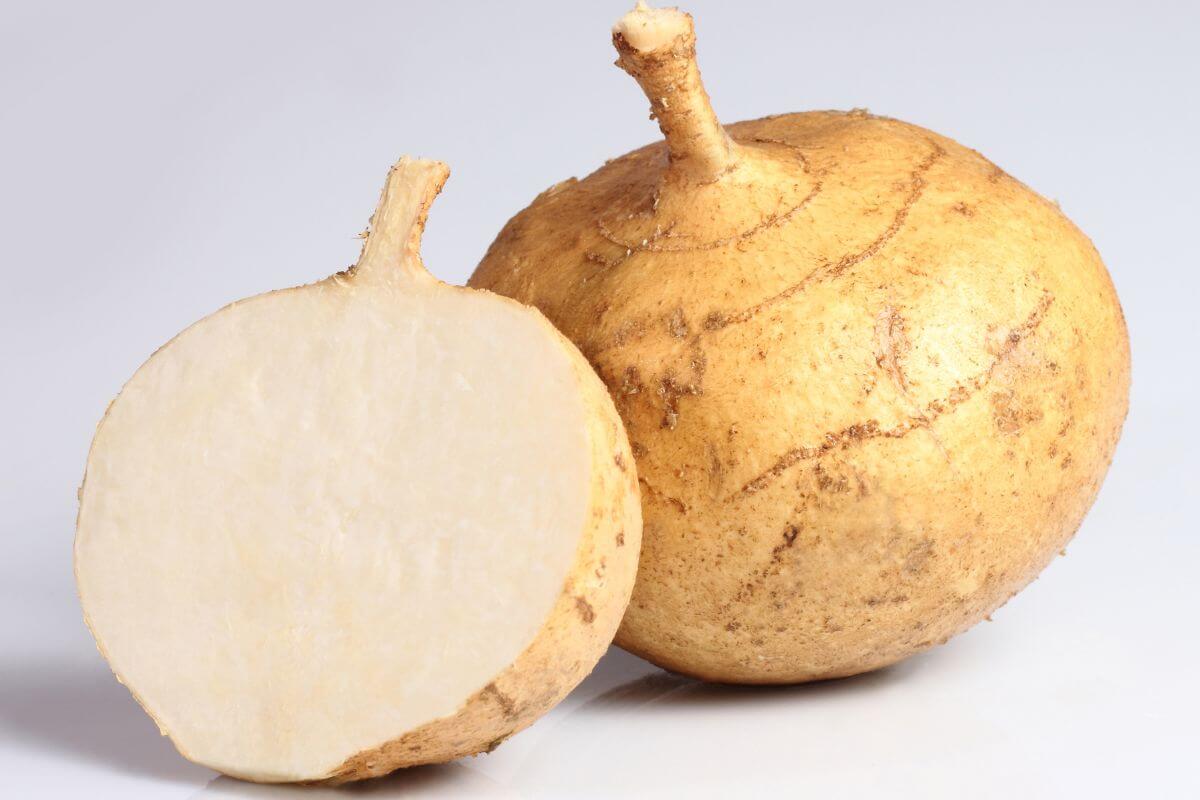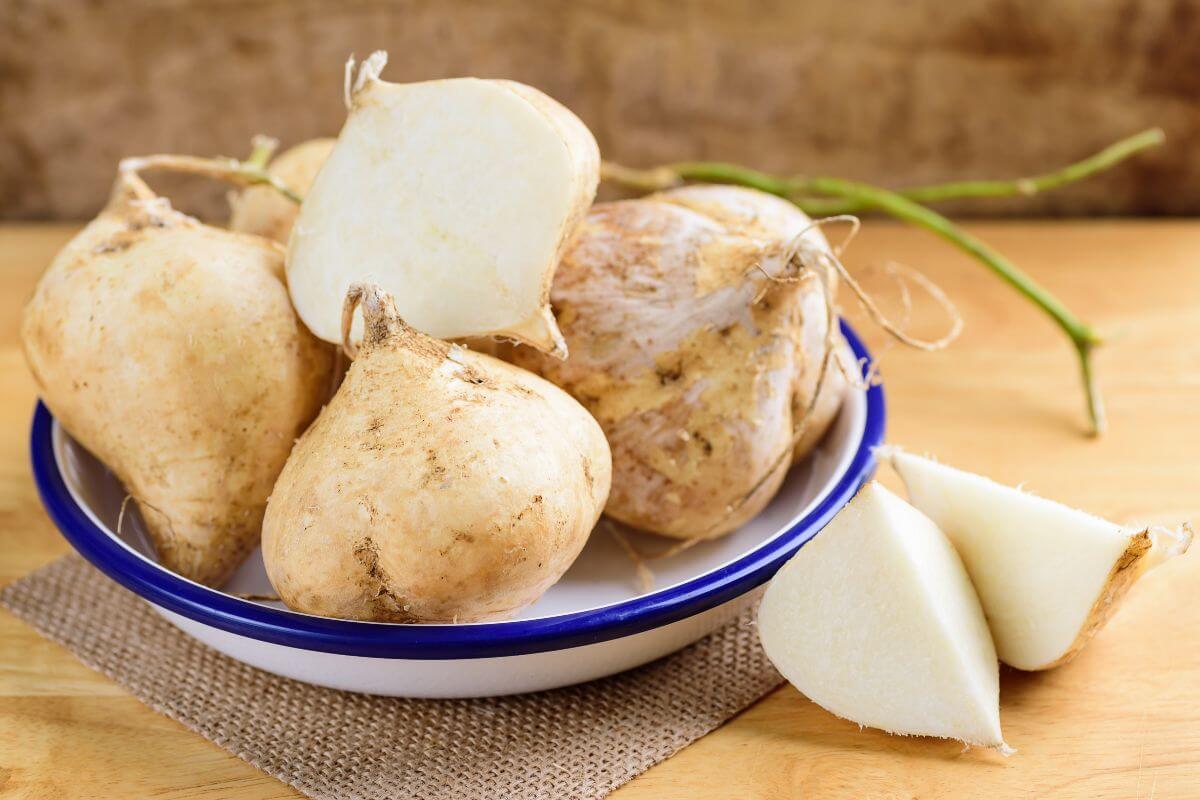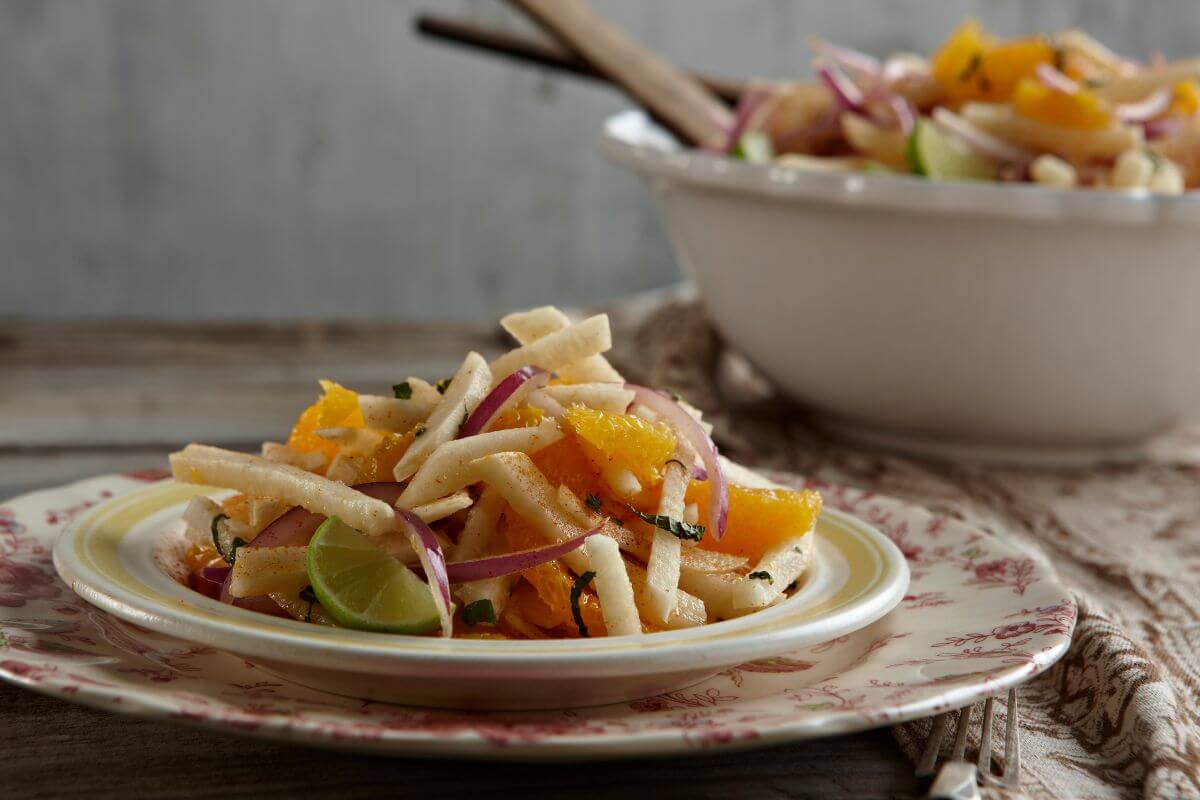Is jicama a fruit or is it a vegetable? That’s a common question for many curious eaters. Despite its sweet taste, jicama is actually a vegetable. It’s the edible root of the Pachyrhizus erosus plant, part of the legume family.
In this guide, I’ll dive into what makes jicama unique. You’ll learn about its botanical background, nutritional benefits, and how to incorporate it into your diet. We’ll also explore why it’s often mistaken for a fruit.
Ready to uncover the secrets of this crunchy, versatile root? Keep reading to discover all there is to know about jicama!
- Related article: What Are the Differences Between Fruits and Vegetables?
5 Key Takeaways on Is Jicama a Fruit or Vegetable
- Jicama is the edible root of the Pachyrhizus erosus plant, part of the legume family. It’s not a fruit since it doesn’t come from the flower’s ovary.
- Jicama has brown skin and white, crunchy flesh. It grows on vines, and only the root is safe to eat. The plant also produces poisonous beans.
- A cup (130 grams) of raw jicama has 49 calories. It offers 1 gram of protein, 1 gram of fat, 12 grams of carbohydrates, and 4 grams of fiber. It’s rich in Vitamin C, potassium, folate, magnesium, and manganese.
- Jicama is great for your health. It lowers the risk of chronic diseases, improves heart health, manages blood sugar, and supports digestion due to its fiber and nutrients.
- You can eat jicama in many ways: raw, roasted, sautéed, or in salads, slaws, stews, and stir-fries. It’s a versatile ingredient that can replace potatoes or water chestnuts in recipes.
Is Jicama a Fruit or Vegetable?
You might wonder if jicama is a fruit or vegetable. Well, jicama is definitely a vegetable. It is the edible root of the Pachyrhizus erosus plant. This plant belongs to the legume family.
Vegetables are parts of plants we can eat. On the other hand, fruits come from the ovary of a flowering plant. Jicama grows underground as a tuberous root. This root is the part we harvest and eat.
What Is Jicama?

Jicama is a thick, brown-skinned root vegetable. It has a round, fleshy shape with starchy white flesh inside. It grows on vines, and only the root is edible. In particular, smaller roots are ideal for eating.
Botanists call jicama Pachyrhizus erosus. It belongs to the Pachyrhizus genus of the pea and bean family, though they don’t look alike.
The vegetable can grow up to 50 lbs and thrives in warm climates. It is grown in Central America, the Caribbean, Southern Asia, and some South American Andean regions.
Growing jicama needs a long season. It won’t tolerate frost, so it grows best where it’s warm all year.
Jicama has several other names:
- Mexican turnip
- Mexican Yam Bean
- Chinese Potato
- Mexican Potato
- Mexican Yam
- Mexican Water Chestnut
- Leaf Cup
Jicama has white flesh with a sweet, crunchy texture. It is often compared to a sweet potato, but its skin is not edible. Its texture is closer to a turnip’s than a potato’s.
The brown skin is thicker and tougher than a regular potato, so you will need a paring knife or sturdy vegetable peeler.
This plant also produces beans similar to lima beans, but jicama beans are highly toxic.
Jicama Nutritional Content

Jicama is great because it has many nutrients like vitamins and minerals that help you stay healthy.
Most of its calories come from carbs. It has a little fat and protein. Jicama is also full of fiber which helps if you want to lose weight.
One cup or 130 grams of raw jicama has 49 calories and these nutrients:
| Nutrient | Amount per 1 cup (130 grams) |
|---|---|
| Calories | 49 |
| Protein | 1 gram |
| Fat | 1 gram |
| Carbohydrates | 12 grams |
| Fiber | 4 grams |
| Vitamin C | 44% of RDI |
| Potassium | 6% of RDI |
| Folate | 4% of RDI |
| Magnesium | 4% of RDI |
| Manganese | 4% of RDI |
Jicama also has:
- Beta-carotene
- Calcium
- Copper
- Pantothenic acid
- Phosphorous
- Riboflavin
- Selenium
- Thiamine
- Vitamin B
- Vitamin B6
- Zinc
Jicama Health Benefits
You might not be able to eat all parts of the jicama, but the edible parts are rich in vitamins and minerals. These parts provide many great health benefits.
1. Jicama Lowers the Risk of Chronic Diseases
Jicama is rich in vitamin C. This vitamin acts as an antioxidant. Antioxidants protect cells from damage. They fight free radicals that cause cell stress through oxidation.
Oxidative stress is linked to chronic diseases. These include cardiovascular disease, cancer, cognitive decline, and diabetes.
Jicama Promotes Heart Health
Jicama has soluble fiber. This helps lower cholesterol. It also stops the liver from making more cholesterol. Eating more fiber can lower bad cholesterol (LDL)
Jicama has potassium, which relaxes blood vessels and lowers blood pressure.
Fiber, potassium, and antioxidants in jicama lower cholesterol and blood pressure. This reduces the risk of heart disease. Jicama also has compounds that prevent blood clots. This lowers the risk of heart attacks and strokes. Plus, jicama is low in calories and sugar, making it a heart-healthy choice.
Jicama Helps Manage Blood Sugar Levels
Jicama is low in sugar and has a low glycemic index. This means it doesn’t cause blood sugar spikes. Studies show jicama’s fiber can prevent high blood sugar and improve glucose tolerance in diabetic animals.
The antioxidants and fiber in jicama may also improve insulin sensitivity and glucose metabolism. This lowers the risk of type 2 diabetes.
Jicama May Reduce Cancer Risk
Jicama’s antioxidants, like vitamin C, vitamin E, and beta-carotene, help neutralize free radicals. This prevents cell damage that can lead to cancer. The fiber in jicama may also lower cancer risk by improving digestion and removing carcinogens from the body.
2. Jicama Is Good for Gut Health

Dietary fiber can help your stool bulk up and move smoothly through your digestive tract.
Jicama contains inulin. This prebiotic fiber improves bowel movements for those with constipation. Its high water content also aids digestion.
A 1-cup serving of jicama has 6 grams of insoluble fiber. This fiber promotes regular bowel movements and prevents constipation. It also improves overall digestive function.
Inulin, a prebiotic fiber in jicama, feeds beneficial gut bacteria. This supports a healthy gut microbiome. A healthy microbiome is key for digestion, nutrient absorption, and immune function.
For those with digestive disorders like IBS, jicama’s fiber and inulin can be extra helpful. They promote regularity and support gut health, easing digestive symptoms.
3. Jicama Aids in Weight Loss
Jicama is full of nutrients and very low in calories. It has lots of fiber and water which help you feel full.
The fiber can also help control blood sugar. Insulin resistance is a key part of obesity because glucose stays in the bloodstream instead of entering cells.
Research shows jicama might boost insulin sensitivity which lowers blood sugar.
The water and fiber content in jicama make you feel full. This can stop overeating and support weight loss. Foods with a low glycemic index help control cravings and make it easier to stick to a diet.
Better insulin sensitivity can regulate appetite hormones and support healthy weight management. Prebiotic fiber is linked to weight loss and may affect hunger and fullness hormones.
Different Ways to Add Jicama to Your Diet

There are many ways to add jicama to your diet:
- Eat It Raw – Slice or cube jicama. Enjoy it with lime juice, chili powder, or salt.
- Snack on It – Add raw jicama slices to veggie platters, and salads, or dip them as snacks.
You can also roast or sauté jicama:
- Roast It – Peel and cut jicama into fries or cubes. Roast with oil and seasonings.
- Sauté It – Cook jicama cubes with vegetables like onions and peppers for a stir-fry.
Try using jicama in salads and slaws:
- Add It to Salads – Thinly slice or julienne jicama. Mix it into salads, coleslaws, or fruit salads.
- Make a Slaw – Combine shredded jicama with crunchy veggies and a tangy dressing.
Incorporate jicama into cooked dishes:
- Add to Stews – Put jicama in stews, soups, or stir-fries for crunch and flavor.
- Substitute – Use jicama instead of potatoes or water chestnuts in recipes.
Make jicama chips or fries:
- Bake or Fry – Thinly slice or cut jicama into fry shapes. Bake or fry until crispy.
- Season – Add spices like chili powder, lime, or salt to jicama chips or fries.
Is Jicama a Fruit or Vegetable Final Thoughts
Jicama packs a punch when it comes to your health. This root veggie is full of good stuff like vitamins, minerals, and fiber. It’s a tasty way to boost your diet.
Want to try jicama? You’re in luck! Most grocery stores stock it. Can’t find it there? No worries. Your local farmers market might have this crunchy treat. Just ask around and you’ll likely score some jicama for your next meal.
Is Jicama a Fruit or Vegetable FAQs
1. Is Jicama a Healthy Snack?
Yes, Jicama is a healthy snack. It is packed with vitamins and minerals that support gut health, aid in weight loss, and may even prevent cancer.
2. Can We Eat Jicama Raw?
Yes, jicama can be eaten raw, but make sure to consume only the roots, as they are the only edible parts of the jicama. You can slice or cube them and enjoy them with chili powder or lime juice.
3. Is a Jicama a Vegetable or a Fruit?
Jicama is a vegetable, falling under the category of plant parts that we can eat. It is not considered a fruit because it does not come from the ovary of a flowering plant.
For other fruits and vegetables and how they’re classified, check out these articles:

